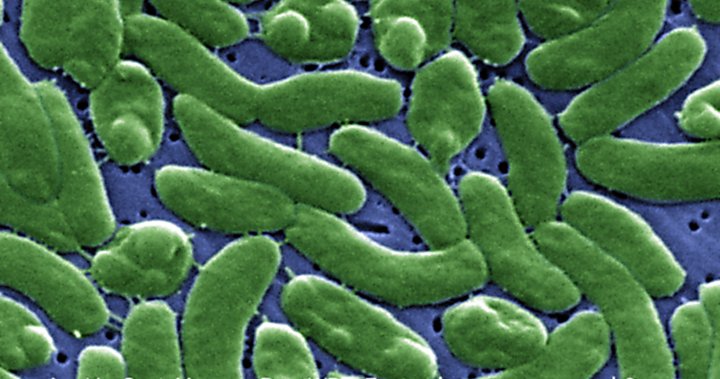A rare and fatal flesh-eating bacteria is slowly creeping up the eastern U.S. coast, and some experts warn that it could eventually find its way into Canada if climate change continues to heat our oceans and lakes.
The bacteria Vibrio vulnificus is usually found in subtropical regions, like the Gulf Coast (in states like Florida and Texas), which is home to warm waters with low salt content. But a recent study published on March 23 in the Scientific Reports journal said that over the last few decades, there has been an increase in the bacteria in northern locations near New Jersey and Delaware.
The study found that Vibrio vulnificus is expanding northward around 48 kilometres a year.
Read more:
Man loses arm after eating raw seafood contaminated with flesh-eating bacteria
Infection in humans by the bacteria could double in the United States within the next 20 years, and even reach Canada in 70 years, the researchers of the study said.
“Vibrio vulnificus is considered the most deadly of the vibrio pathogens. You just need a tiny cut on the skin or even an insect bite and this can become infected through exposure to the bacteria in seawater,” lead study author Elizabeth Archer told Global News.
The tiny cuts can get infected and then develop necrotizing fasciitis (also known as flesh-eating bacteria). It then can spread rapidly (in a matter of days) and people will need anti-biotic treatment or even surgical removal of tissue to prevent spread into the bloodstream, she explained.
Archer, who is also a postgraduate researcher at the University of East Anglia in the United Kingdom, said that if greenhouse gas emissions are kept low, then cases of this bacteria may extend only as far as Connecticut. But if emissions remain high, then this type of flesh-eating bacteria is “predicted to occur in every U.S. state on the East Coast.”
‘Will find a home further north’
The spread of the life-threatening bacteria is likely caused by hotter temperatures that are warming coast waters, the study said. An increase in temperature affects the salinity in the water, which the bacteria favours.
As northern waters start warming, this bacteria will find a home in places like New York, Boston and even Canada, Jason Tetro, a microbiologist based in Edmonton and specialist in emerging pathogens, told Global News.
“When you start looking at temperature increases, we’ve been going at a warming rate of 1.2 (degrees Celsius),” Tetro said. “But if we get up to 1.5 degrees, then what’s going to end up happening is we’re going to have summers that are very similar to tropical ones in places like Quebec City.”
This bacteria “is going to find a home further north,” he said, which is what the author found in the study.
In the past, Vibrio vulnificus usually occurred along the Gulf of Mexico and the southern coast of the Atlantic Ocean but were uncommon in the waters north of Georgia. But from 1988 to 2019, the study found infections have been expanding farther north, reaching places like Philadelphia.
Read more:
Woman dies from flesh-eating bacteria after cutting leg at Florida beach
By 2081 to 2100, the researchers said they predict the bacteria may reach areas in New York and migrate as far north as the St. Lawrence River in Canada.
But Archer noted that this is an “unlikely worst-case scenario” that is at odds with increasing clean energy use.
“These are predictions, so we can’t rule out that it could move out into Canada potentially,” she said.
Once temperatures reach a point where the bacteria can “essentially survive” in the Great Lakes, it can then travel to more “brackish ” waters in Canada, Tetro said. These are waterways that have more salinity than freshwater.
“If there’s seawater, then there’s potential for it to grow,” he added.
What is vibrio vulnificus and how can it affect humans?
Vibrio vulnificus is a bacteria from the same family as the one that causes cholera and also can cause what’s commonly known as a flesh-eating infection.
Infections are rare but can be life-threatening, but according to the CDC, about one in five people with this type of infection die, sometimes within a day or two of becoming ill.
“Normally it won’t pose a threat unless it gets into wounds or potentially you drink it at high concentrations,” Tetro explained. “But once it gets into wounds, it essentially starts breaking down your barriers and can invade the immune system.”
And if you are immunocompromised in any way, such as a senior over the age of 70, then the bacteria can have greater potential for severe e disease or death, he said.
An infection can also occur when someone consumes raw or undercooked fish.
There isn’t any evidence of person-to-person transmission of the bacteria.
“It is a serious risk to human health, and I think (this study) highlights the connection between human health and the health of the environment,” Archer said.
And while the fatality case numbers for getting infected with this bacteria remain low (around 100 people in the U.S. every year), Archer said as Vibrio vulnificus expands north it will hit more populated areas, meaning more people could be at risk in the future.
© 2023 Global News, a division of Corus Entertainment Inc.
Stay connected with us on social media platform for instant update click here to join our Twitter, & Facebook
We are now on Telegram. Click here to join our channel (@TechiUpdate) and stay updated with the latest Technology headlines.
For all the latest Health & Fitness News Click Here

